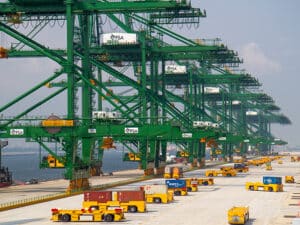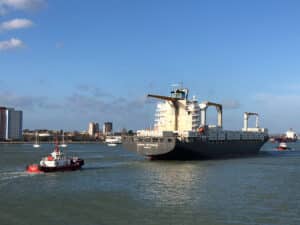
Op-Ed: There is nothing artificial about AI in shipping now
Written by
Angus Whiston, Communications Director, DeepSea Technologies
By Angus Whiston, Communications Director, DeepSea Technologies
Artificial intelligence (AI) is growing in prominence as a powerful decarbonization tool for the shipping sector. Parts of the industry remain skeptical about the technology, however, amid accusations of AI being excessive and over-hyped—most prevalent among more traditionalist and conservative players in the industry. It is crucial that maritime digital tech experts work to debunk false assumptions, and address criticism in a way that is fair, honest, and responsible.
With the International Maritime Organization (IMO)’s CII regulations now in force, and coming into effect in January 2023, optimizing vessel performance has never been more critical. The industry now faces the massive challenge of making conversions to existing assets, to ensure compliance with these new conditions – or risk substantial fines that will jeopardize commercial success.
Large players within the shipping industry are embracing AI-driven efficiency measures, including the world’s largest in RoRo shipping and vehicle logistics, Wallenius Wilhelmsen (WWL), which has recently deployed DeepSea’s AI-powered voyage optimization tool, Performance Routing. Adopting the solution as a key part of its decarbonization strategy WWL plans to transition to an entirely AI-based approach to voyage planning across its entire fleet. This marks a major milestone in the real-world adoption of AI in shipping.
Shipping’s AI journey has only just begun
As new thinking enters the age-old field of weather routing, AI technology is revolutionizing routing to such a degree that it should be classed as a different solution entirely. DeepSea calls this Performance Routing. Transformed from merely a safety asset to a transformative decarbonization tool, Performance Routing offers powerful potential when it comes to meeting requirements of new regulations such as CII.
Despite this technology offering a wealth of emissions-reduction and cost-saving benefits, all of the effort that has gone into its development will have been in vain if the industry fails to embrace it as a key element of the energy transition. Currently, the biggest claim made by skeptics is that AI-led insights drive conclusions based upon a blind trust in the data, and rush to make assumptions that are not necessarily related to or underpinned by real-life, operational maritime knowledge. There is also a challenge with verification of the real use of the technology—an issue faced by both end users, and AI researchers and providers themselves.
To cement AI’s role as a major ally for shipping companies in their decarbonization, cost and fuel efficiency efforts, credible researchers working to popularize AI adoption in maritime must pursue rigorous methods of proving the real value of what they’re creating.
Silencing the skeptics
One way of doing this is to develop robust models, which will be essential in enabling the effective deployment of AI-based technology, and in turn reduce the carbon footprint of global supply chains. This will also act as a stamp of approval for all companies working with AI in the shipping industry.
The industry also needs a benchmark for evaluating AI competence within a vessel model, and wider skepticism. Real life, tangible examples of AI “working” at sea that verifies the ‘virtual model’ has a significant role in what can be achieved in developing a more efficient ship, which in turn provides data that can improve the modelling. As it stands, most model accuracy figures reported in publications and marketing materials fail to bear relation to the actual usage of those models in the real world, because the reality of ship-at-sea data is highly variable.
The next step to proving the real-world utility of AI approaches is to advocate for common and transparent standards for AI across the shipping industry, and related segments such as ports and wider logistics.
The digital tech sector in shipping has a huge responsibility. It must fight the hype and support an honest approach to AI to help the wider shipping community, if it is to truly understand the power of an AI-based approach and alleviate its limitations. Only in this way will AI experts be able to make an increasing impact on shippers’ bottom-lines and on the sustainable future of the planet.




